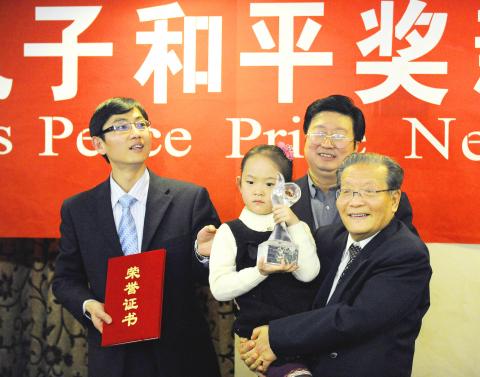It was meant to be China’s answer to the Nobel Peace Prize, a timely riposte to the honoring of jailed dissident Liu Xiaobo (劉曉波). But the winner of the first “Confucius Peace Prize” didn’t even show up.
Instead, it was left to a scared-looking girl, whom organizers did not properly identify, to collect a stack of bills for the US$15,000 cash prize meant for former vice president Lien Chan (連戰).
Lien had won the prize for his efforts to improve relations between China and Taiwan.

Photo: AFP
“We believe that Mr Lien Chan, with his knowledge, dignity, and political wisdom, would not refuse peace, and he would not refuse this prize,” Confucius Prize organizer Tan Changliu (譚長流) told a packed news conference in Beijing.
Lien has not commented publicly on the prize.
Mainland Affairs Council Chairwoman Lai Shin-yuan (賴幸媛) told lawmakers in Taipei that the government found the prize “amusing.”
“As far as we know it is an unofficial prize. We don’t plan to make any comment on it,” she said. “But we do find it amusing.”
Lien traveled to China in 2005 in his then capacity as chairman of the Chinese Nationalist Party (KMT).
He has since visited China numerous times and had several meetings with Chinese President Hu Jintao (胡錦濤).
The prize, offered before more than 100 journalists in a cramped windowless conference room in a Beijing office block, was first suggested in an opinion piece in the Chinese tabloid the Global Times three weeks ago.
Tan said China’s prize had nothing to do with the government.

SECURITY: As China is ‘reshaping’ Hong Kong’s population, Taiwan must raise the eligibility threshold for applications from Hong Kongers, Chiu Chui-cheng said When Hong Kong and Macau citizens apply for residency in Taiwan, it would be under a new category that includes a “national security observation period,” Mainland Affairs Council (MAC) Minister Chiu Chui-cheng (邱垂正) said yesterday. President William Lai (賴清德) on March 13 announced 17 strategies to counter China’s aggression toward Taiwan, including incorporating national security considerations into the review process for residency applications from Hong Kong and Macau citizens. The situation in Hong Kong is constantly changing, Chiu said to media yesterday on the sidelines of the Taipei Technology Run hosted by the Taipei Neihu Technology Park Development Association. With

CARROT AND STICK: While unrelenting in its military threats, China attracted nearly 40,000 Taiwanese to over 400 business events last year Nearly 40,000 Taiwanese last year joined industry events in China, such as conferences and trade fairs, supported by the Chinese government, a study showed yesterday, as Beijing ramps up a charm offensive toward Taipei alongside military pressure. China has long taken a carrot-and-stick approach to Taiwan, threatening it with the prospect of military action while reaching out to those it believes are amenable to Beijing’s point of view. Taiwanese security officials are wary of what they see as Beijing’s influence campaigns to sway public opinion after Taipei and Beijing gradually resumed travel links halted by the COVID-19 pandemic, but the scale of

TRADE: A mandatory declaration of origin for manufactured goods bound for the US is to take effect on May 7 to block China from exploiting Taiwan’s trade channels All products manufactured in Taiwan and exported to the US must include a signed declaration of origin starting on May 7, the Bureau of Foreign Trade announced yesterday. US President Donald Trump on April 2 imposed a 32 percent tariff on imports from Taiwan, but one week later announced a 90-day pause on its implementation. However, a universal 10 percent tariff was immediately applied to most imports from around the world. On April 12, the Trump administration further exempted computers, smartphones and semiconductors from the new tariffs. In response, President William Lai’s (賴清德) administration has introduced a series of countermeasures to support affected

Pope Francis is be laid to rest on Saturday after lying in state for three days in St Peter’s Basilica, where the faithful are expected to flock to pay their respects to history’s first Latin American pontiff. The cardinals met yesterday in the Vatican’s synod hall to chart the next steps before a conclave begins to choose Francis’ successor, as condolences poured in from around the world. According to current norms, the conclave must begin between May 5 and 10. The cardinals set the funeral for Saturday at 10am in St Peter’s Square, to be celebrated by the dean of the College